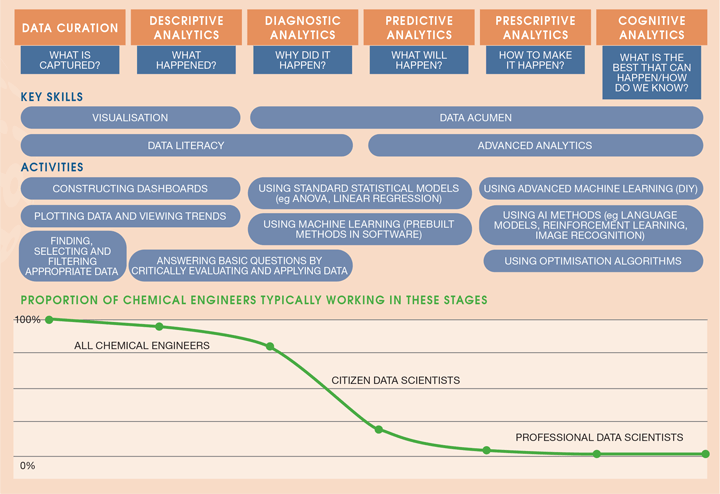Data Science and Digitalisation for Chemical Engineers
Matthew Proctor and Leo Chiang discuss how the proliferation of data and ways to use it is impacting the role of chemical engineers
As Industry 4.0 continues to progress, process-based industries are facing a new reality: a significant increase in the volume, velocity, and variety of data. Digital technologies, such as the Industrial Internet of Things (IIoT), and increased connectivity between processes and enterprise have opened up new ways of doing business. This is the essence of digitalisation: using data to transform old ways of doing business and create value. With this comes the opportunity to make more informed decisions, and that’s where chemical engineers come in.
There is more data available now than ever before due to the proliferation of low-cost sensors, new methods for analysing previously overlooked data like images and text, and advancements in digital technology that make it cost-effective and efficient to gather, contextualise, and distribute data across the enterprise. This is why concepts such as IIoT, cloud and edge computing, and data lakes are important to the improvement of processes in the field. Simply giving people access to real-time data creates new possibilities as they can make informed decisions based on current and accurate information instead of relying on assumptions or outdated data. Furthermore, there have been innovations in machine learning that allow software to analyse data to help make process improvement decisions. This can lead to insights that would have been impossible to discover without increased data availability and access.
This article provides insights to chemical engineers on how to stay current as digitalisation continues to advance, showcases data science methods currently being used in industry, and brings attention to the operationalising of data science.
Impact of digitalisation on the role of chemical engineers
As digitalisation progresses in the process industry, the role of the chemical engineer will change. Chemical engineers need to be equipped not only with fundamental knowledge, but with digital skills. In a digitalised world, these two skillsets are complementary, and chemical engineers need to be taught to be dual-domain experts.
The ‘data science journey’ (Figure 1) provides a useful framework for exploring the impact of digitalisation on the role of chemical engineers. At each stage of the journey, different and greater levels of digital skills are needed. Not all chemical engineers need the skills to operate at all stages. Depending on their career goals and current duties, they may need only basic digital skills. However, there is a benefit to some chemical engineers learning the skills needed to operate at higher stages of the journey, as this will enable them to drive more advanced projects and greater value.

We use the terms “data literacy” and “data acumen” to describe two skillsets that chemical engineers may use when handling data. Data literacy is the ability to collect, manage, evaluate, and apply data in a critical manner and is essential for chemical engineers working in the digital age. This includes use of descriptive analytics such as basic summary statistics, and diagnostic analytics such as hypothesis testing. These concepts are often taught in undergraduate courses but may require increased focus as they are needed by a larger proportion of engineers in their daily work.
Data acumen describes having good data judgement and includes things like modelling skills for predictive analytics. The term “citizen data scientist” is used to describe people that can use commercial analytics tools and basic programming skills to analyse data. For a chemical engineer to become a citizen data scientist is to become more proficient in the use of data to support their work, and in dealing with data of varying formats, for example in broadening their horizons beyond only using time series historical data. Some universities are offering data science/analytics courses in chemical engineering to teach these concepts.
For readers interested in improving their data literacy and acumen, we recommend online courses in data science, programming, and analytics. Examples of these are found on Kaggle, Coursera, edX, and LinkedIn Learning. We also recommend networking with colleagues experienced in these domains and taking advantage of any in-house training offered by their organisation.
The prescriptive and cognitive analytics stages are the domain of professional data scientists. While this is a niche role, it’s often filled by chemical engineers who can combine their fundamental process knowledge with advanced programming and analytics skills. These are people that understand how to properly use, research, and improve cutting-edge tools. They are in a good position to provide internal training to upskill workforce in data literacy and acumen.
Chemical engineers need to be equipped not only with fundamental knowledge, but with digital skills. In a digitalised world, these two skillsets are complementary
Recent Editions
Catch up on the latest news, views and jobs from The Chemical Engineer. Below are the four latest issues. View a wider selection of the archive from within the Magazine section of this site.




